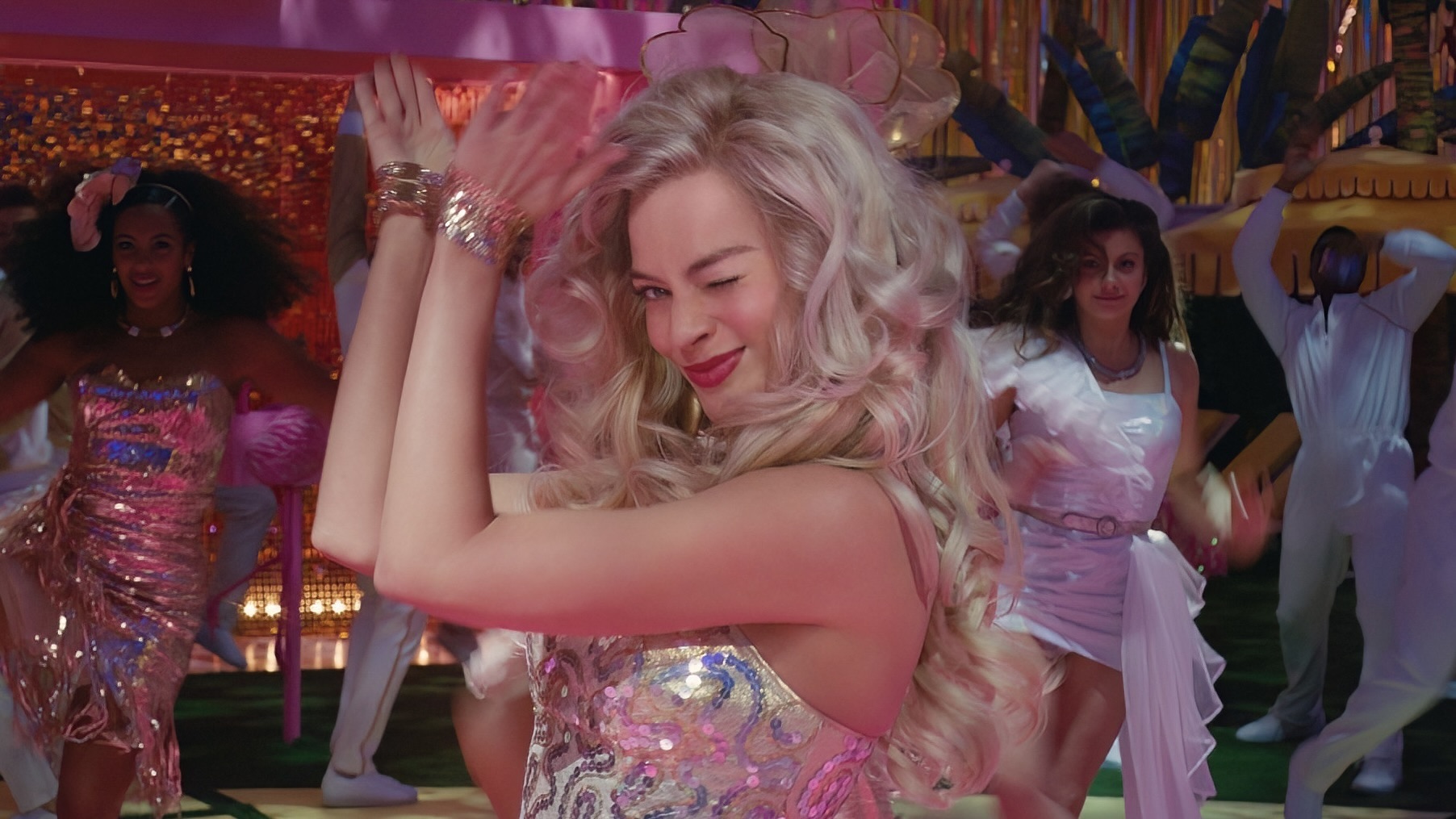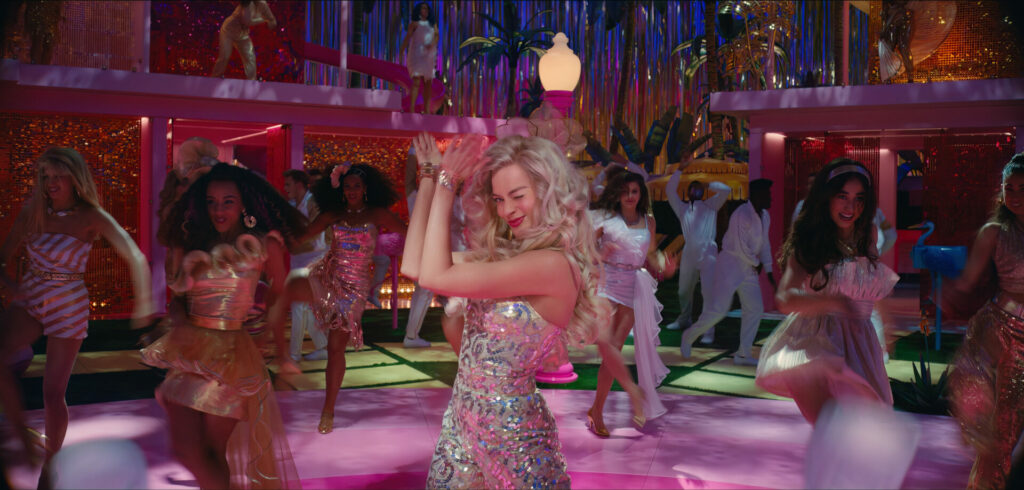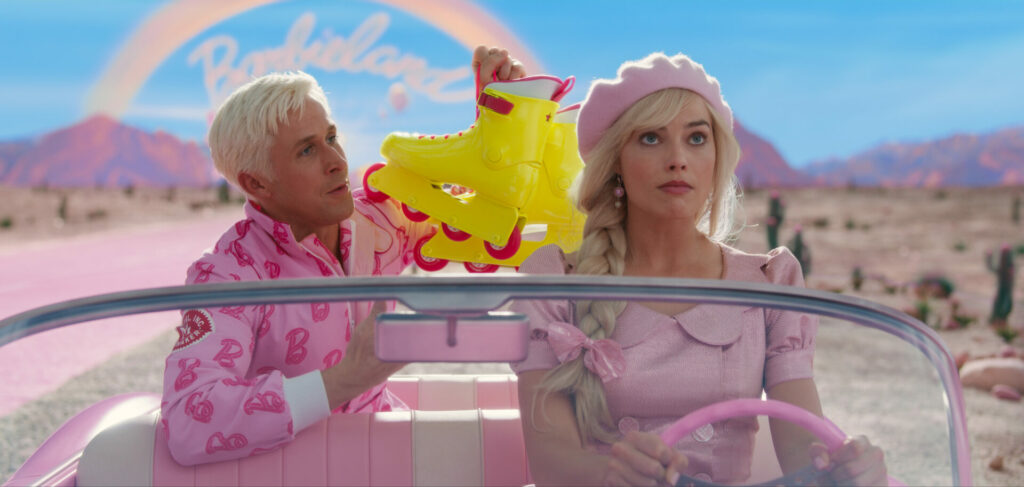Barbie review: The theatrical, camp, and hilarious technicolour movie of your dreams
"This is Barbie like you’ve never seen her before."

It’s rare to walk into the cinema and already know you’re witnessing a moment for the pop culture history books. In the case of Barbie, it feels as though a whole chapter will be dedicated to the casting, production design, and marketing of this technicolour movie which is everything and nothing you’d expect.
Greta Gerwig returns for her fourth directorial feature, this time a fantasy-comedy sprinkled with the essence of a musical. It’s a cinematic reckoning of consumer culture made accessible with a wicked sense of humour and archness that will leave you in awe.
On a grand scale and with the blessing of Mattel (somehow!), Barbie proves a theatrical take on the titular doll’s enduring legacy and simultaneously an impressively nuanced and moving portrait of womanhood.
Margot Robbie’s note-perfect performance as the titular ‘Stereotypical Barbie’ is where the focus lies. She’s the embodiment of Barbie’s original image: blonde, slim, with glowing skin, and wakes up in freshly ironed pyjamas with a smile.
Her dreamy abode in the impeccably manicured Barbie Land is a pristine pink palace (Sarah Greenwood’s production design will undoubtedly be some of the best of the year). Barbie Land is a utopia where women are celebrated, successful, invigorated, and inspired. This world operates on child-like logic: no water, no mirror, the sand, it never rains and sunrise to sunset happens in just a matter of seconds.
Dialogue, too, initially pertains to how youngsters voice their dolls: Ken can’t stay over? Why? Not too sure yet. Also, no need to use the stairs, Barbie can just float from the roof to the car. With Helen Mirren’s narration, the historical footing of the Mattel dolls is laid out with the blueprint of Barbie Land lore: “She’s everything. He’s just Ken.”

Like all of Gerwig’s films, Barbie is ultimately a tale of self-discovery and things click into gear when, on one fateful evening, Barbie begins to think about dying. With a record scratch and horrified gasps, she’s thrown into a soul-consuming existential crisis.
Oh, also, even more terrifying: she now has flat feet. She’s left with a choice delivered by Weird Barbie (the ever-hilarious Kate McKinnon): heels (the blue pill) or the Birkenstock (the red pill)? It’s a choice between complicity and adventure, but there’s only one answer. Barbie sets off to the real world to cure her depressive thoughts and podiatric issues.
However, she’s not alone on this whirlwind trip; Ken (Ryan Gosling), her ever-loyal companion, is coming too. Opposite Robbie, Gosling delivers a performance only he could: a flamboyant, joyous, and downright scene-stealing turn as Barbie’s bleach-blonde boyfriend.
Whether he’s in a leather cowboy jacket finished with fringe or a floor-length mink jacket (Jacqueline Durran’s costumes are impeccable), Gosling struts through a scene as if he owns it with a body that looks like it was sculpted from, well, plastic.
From emotionally taut confessions to dynamic musical numbers that feel lifted from a Jacques Demy film, Gosling does not disappoint – believe the hype!
Likewise, the stellar cast of Barbies (Issa Rae, Emma Mackey, Sharon Rooney), Kens (Ncuti Gatwa, Simu Liu, Kingsley Ben-Adir), and the loveable queer-coded Allan (Michael Cera) tackle meta-adlibs and existentialism with ease.
Once, every day was the best day ever but when Barbie and Ken cross over into the human world, the pair are faced with a terrifying reality: that female agency of Barbie Land isn’t celebrated everywhere.
It’s here, in the heart of Los Angeles, they’re embraced by Gloria (America Ferrera), a loving mother and long Barbie adorer whose heart still beats with unfulfilled dreams. It’s Ferrera who delivers an Oscar-worthy monologue that you’ll want to be engraved.
Her fighting spirit is emboldened by a soundtrack consisting of Charli XCX, Dua Lipa, Pink Pantheress, and more as this newly formed collective of characters team up to rebel against the FBI and Mattel executives on their tail.

While questions about Gerwig’s dealings with this widely commercial story based on existing IP are worthy of note, Barbie demonstrates a director not prepared to bow to the Barbie overlords. Gerwig doesn’t shy away from bold strokes, with all its socio-cultural complexities, and despite the very rare disorganised moment, Gerwig locates Barbie iconography beyond superficialness. In this meditation on womanhood, Barbie is surprisingly heartfelt, wondrously captivating, and playfully incisive.
The film culminates with the question can Barbie ever really adapt? Throughout the Mattel doll’s existence, Barbie has undergone endless reincarnations all in the pursuit of keeping up with the times of corporate feminism.
Such notions are cheekily underscored with a pink boardroom occupied by old men (helmed by Will Ferrell in his best performance in years) who declare their paramount interest to be “empowering women.”
Ultimately, Barbie is so many things: a stereotype, a toy, an idea; a vessel of imagination; a cultural relic. But in Gerwig’s trusted hands, this is Barbie like you’ve never seen her before.
Barbie is in cinemas on 21 July.
This piece was written during the 2023 WGA and SAG-AFTRA strikes. Without the labour of the writers and actors currently on strike, the movie being covered here wouldn’t exist.
